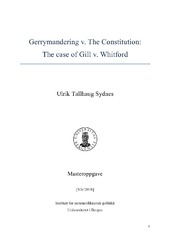| dc.description.abstract | In this case study I analyze partisan gerrymandering in the United States with the research question: Does partisan gerrymandering violate the Constitution of the United States of America? With this as a starting point I use the Supreme Court case of Gill v. Whitford about redistricting in Wisconsin as this studies case. I start off with an introduction to some views on representation that informs the conflict in the case. Whether one has a dyadic or collective view of representation could be a huge influence on ones opinion of gerrymandering’s legality. Then I go in detail on how the redistricting process works in the United States, some of the mechanisms in place to ensure a fair redistricting process and explain what gerrymandering is. I also present the parts of the American Constitution that partisan gerrymandering might be in violation of. To get background information on how gerrymandering is treated in the court system, I found it important to do a breakdown of the most important Supreme Cases on the field. Then I looked at the case at the center of my paper. The data I used in discussing and concluding on the issue is mainly collected through document analysis of the amicus briefs filed in Gill v. Whitford. I sorted the arguments in what I found to be the most important categories. The two main things the oral arguments and the amicus briefs seemed to focus on were the First Amendment and how a manageable standard would look like. I conclude the thesis as following: With Gill v. Whitford as the case of study, I find that partisan gerrymandering is a violation of the Constitution of the United States of America. It is probably not a violation of the Equal Protection Clause of the Fourteenth Amendment, where my opinion is colored by how the Supreme Court has ruled in previous gerrymandering cases. However, I do believe that partisan gerrymandering violates the First Amendment and its freedom of association. I find that voting is a free speech activity and that when the state dilutes the vote of voters with a certain political leaning, it becomes a form of viewpoint discrimination. The First Amendment guarantees free expression and association, but partisan gerrymandering violates that when it is used to punish individuals for their viewpoint by diminishing their vote. | en_US |
